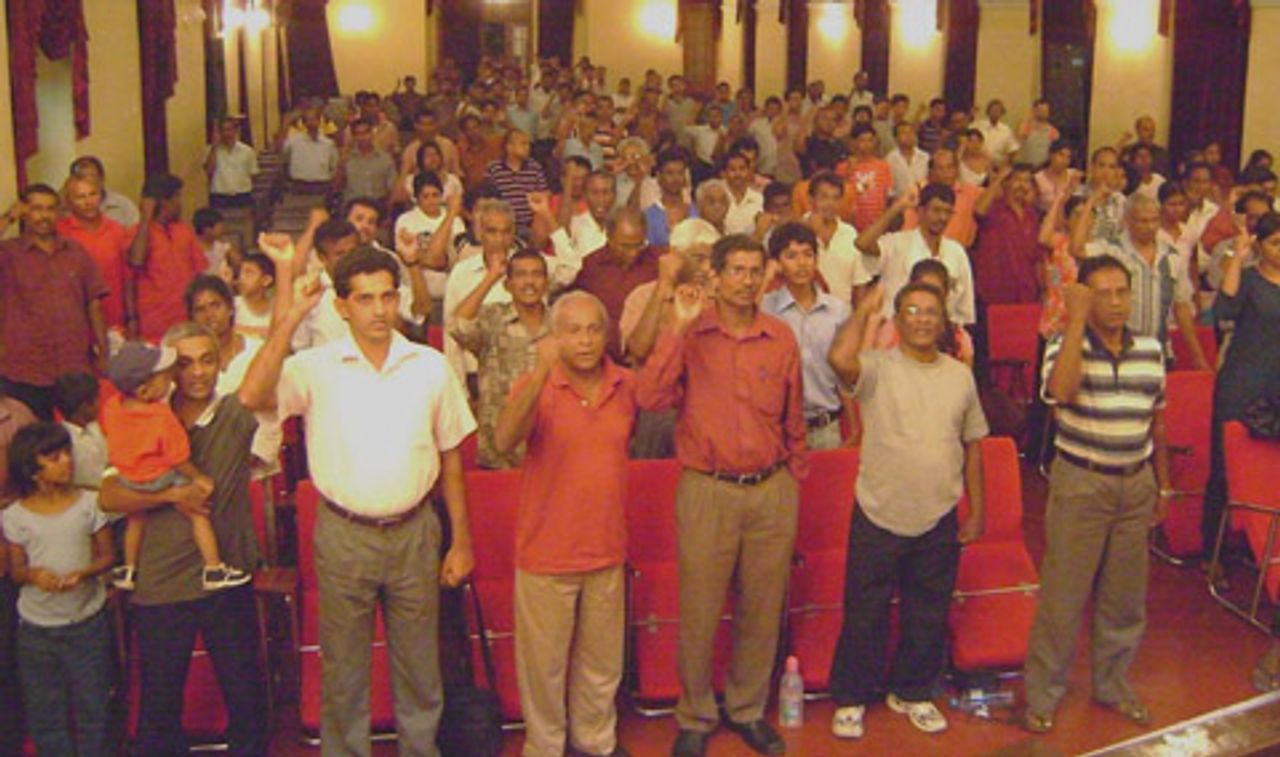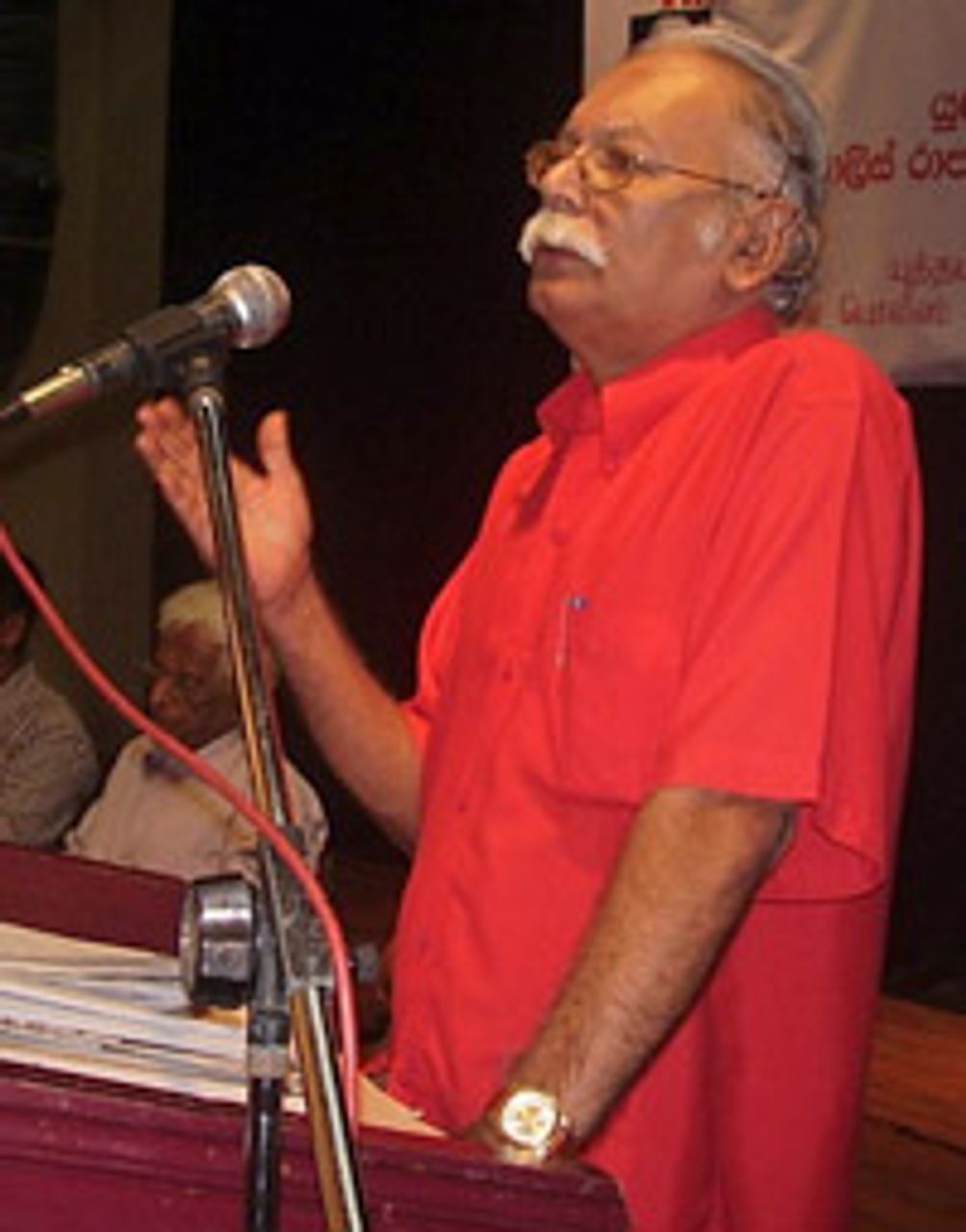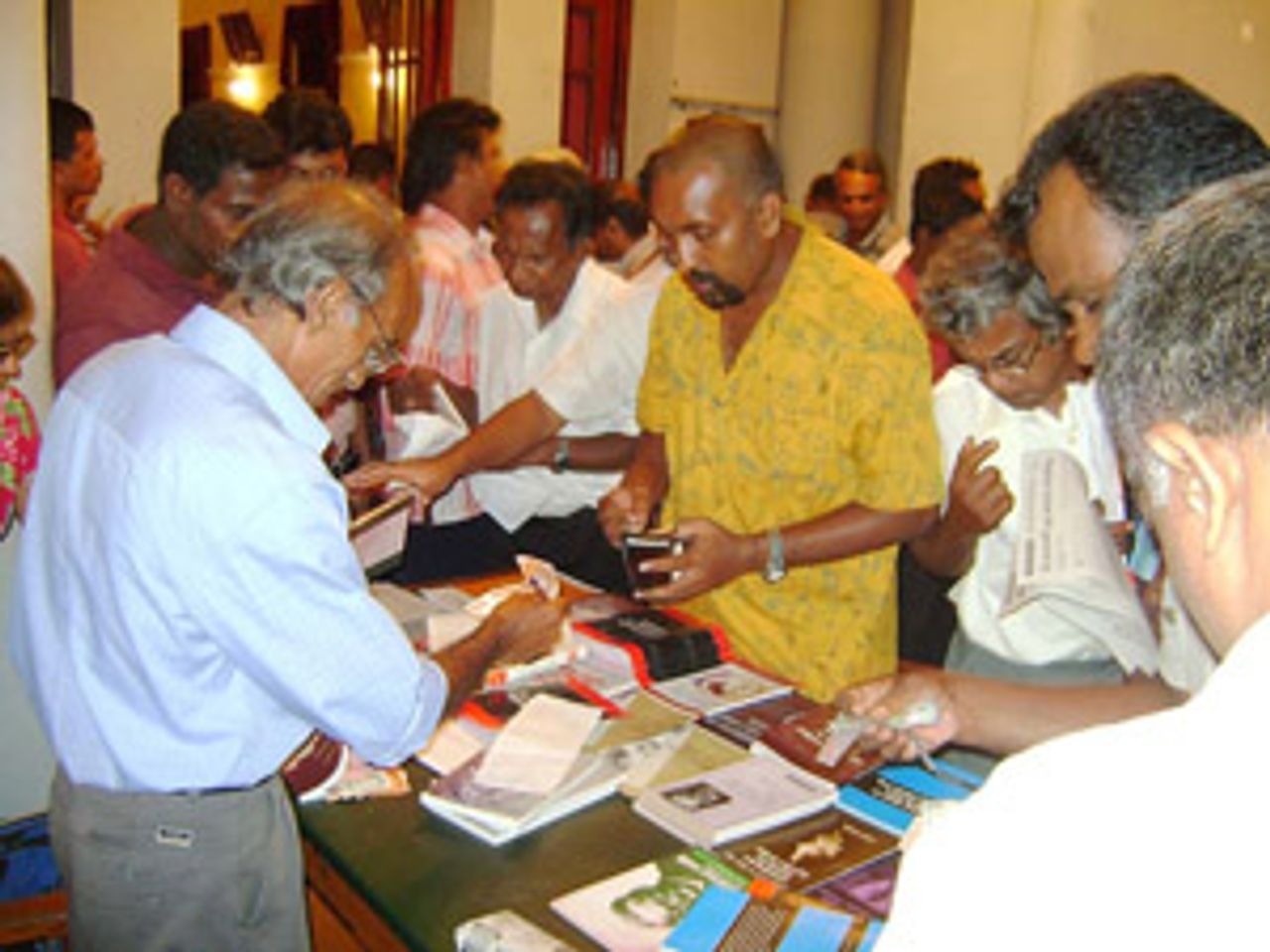The Socialist Equality Party (SEP), the Sri Lankan section of the International Committee of the Fourth International (ICFI), and International Students for Social Equality (ISSE) held a public meeting in Colombo yesterday to mark May Day.
Held at the New Town Hall, the meeting was attended by around 150 workers, students, young people and housewives. Among the audience were Tamil-speaking workers from the central hills district as well as industrial workers and university students. The main speeches were translated into Tamil by SEP political committee member M. Thevarajah.
 Singing the Internationale
Singing the Internationale
SEP political committee member K. Ratnayake, who chaired the meeting, began by extending fraternal greetings to the SEP’s sister parties in the US, Britain, Australia, Germany and Canada. He explained that in the deepening global economic crisis, the ICFI was building the necessary leadership in the working class to fight for an internationalist and socialist solution.
“Marking of May Day is not a ritual for us,” he said. “As announced in the declaration of May Day in 1889 by the Second International under the leadership of Engels, it is part of the fight to unite the workers internationally against capitalism. May Day is being held in this country in a poisonous communal atmosphere as President Mahinda Rajapakse’s government intensifies its criminal war to capture a small patch of land in Mullaithivu district. Some 50,000 Tamil civilians are trapped in this so-called no fire zone.”
Ratnayake pointed out that on May Day, President Rajapakse had met with trade union bureaucrats affiliated to his Sri Lanka Freedom Party (SLFP), urging them to continue their efforts to whip up support for the government’s war.
Likewise, the Sinhala extremist Janatha Vimukthi Peramuna (JVP) was using May Day to press the president to continue with the war without any pause. Those parties that claimed to oppose the war—the Nava Sama Samaja Party (NSSP) and United Socialist Party (USP)—were also having rallies. Both those opportunist organisations were making futile appeals to the major powers to intervene in Sri Lanka to arrange a ceasefire between the Liberation Tigers of Tamil Eelam (LTTE) and the Colombo government.
“All these rallies are a continuation of the role that these parties play every day in dividing workers and tying them to capitalist parties,” the speaker said. “In opposition to all these parties, only the SEP is advancing an independent political perspective against the war and to defend democratic rights and living standards on the basis of socialism.”
SEP political committee member Vilani Peiris pointed to the wars being waged in the region by US imperialism. “As the world crisis deepens, the major powers and countries like Sri Lanka are resorting to war and violence against the masses. The US invaded Afghanistan and Iraq. Now the US is bombarding the border areas of Pakistan near Afghanistan.
“The US is pressing Islamabad to unleash the military on its people. In the recent offensive to regain the province of Buner captured by the Taliban, government forces reported killing 75 Taliban fighters, but tens of thousands of ordinary people have been transformed into refugees.”
The major powers had backed the Rajapakse government’s three-year-old war, Peiris said, but they now expressed concern about the conflict. The British and French foreign ministers David Miliband and Bernard Kouchner had come to Colombo to express their concerns this week, but their mission was filled with hypocrisy.
“After meeting them, Rajapakse yesterday questioned the right of these foreign ministers to raise any objections. He argued that if they wanted a ceasefire in Sri Lanka they should cease bombing Iraq and Afghanistan. In other words, Rajapakse insisted his government should have the right to bomb civilians as the major powers do.”
Peiris explained that the protracted war in Sri Lanka demonstrated that the ruling class cannot solve any of the burning problems facing the working class and oppressed masses. As Leon Trotsky had spelled out in his theory of Permanent Revolution, the working class had to mobilise independently to rouse the farmers and other oppressed masses to fight for a workers’ and peasants’ government. That was the SEP’s perspective, the speaker emphasised.
ISSE convener Kapila Fernando said: “This May Day has arrived amid the eruption of the deepening world capitalist crisis. This means that young people have no future within this order. Under the outmoded profit system, workers and young people face not only unemployment and declining living standards, but environmental problems and cuts to health and education.”
Fernando said that young people and the working class were not responsible for the crisis and should not be burdened with it. “The developments of science and technology have provided the means to solve the problems confronting the masses. But under the profit system, these means are run by capitalists. This contradiction can only be solved scientifically through the socialist reorganisation of the world.”
 SEP general secretary Wije Dias
SEP general secretary Wije DiasSEP general secretary Wije Dias delivered the main speech. He began by pointing out that the traditions of May Day had been diluted and adulterated. The current very low participation was not like the past when tens of thousands of workers came onto the streets to show their strength.
“When May Day was declared in 1889, the purpose was to unite the working class internationally against capitalism. The Trotskyist Bolshevik Leninist Party of India (BLPI) was the only organisation that fought for a working class perspective along these lines in the Indian sub-continent in the 1940s. The strength of the working class was this independent policy,” Dias emphasised.
Dias said: “The Sri Lankan ruling class did not have an independent policy. It did not even demand independence in 1948, but dominion status under British imperialism. The British imperialists granted independence as they faced problems after the Second World War and the rising struggles of the working class.
“The root of the present problems of the working class can be found in the betrayal carried out by the Lanka Sama Samaja Party [LSSP] in 1964. The LSSP entered the bourgeois government of Sirima Bandaranaike and betrayed the political independence of the working class. This betrayal allowed the ruling elite to intensify its use of communalism to divide working people.”
Dias explained that the objective laws of the class struggle were more powerful than the government and its communal politics. The government was in a deep financial crisis and had sought an IMF loan of $US1.9 billion. Rajapakse would turn to attack the conditions of the working class—Tamil and Sinhala—inevitably fuelling common struggles by workers.
 Keen interest in Marxist literature
Keen interest in Marxist literatureThe speaker pointed out that the military had killed thousands of Tamil civilians in recent months through indiscriminate shelling. He warned that the repressive measures utilised in the war would be turned on workers fighting for their rights and living standards.
“Against the division of the working class on communal lines, we fight to unite them,” Dias explained. “We demand the unconditional withdrawal of Sri Lankan forces from the north as part of this struggle to unite workers, without giving any political concessions to the LTTE.
“Our perspective is a workers’ and peasants’ government—the Socialist Republic of Sri Lanka and Eelam. The Sri Lankan working class cannot carry out this task alone. Socialism cannot be achieved in isolation on this island. The working class here must unite with the international working class and fight for the Union of Socialist Republics of South Asia and internationally.”
Dias concluded by calling on workers and youth to join the SEP and ISSE. He urged them to read the World Socialist Web Site, which provided daily analysis and a political perspective for workers and youth. The meeting ended with a generous collection of 16,140 rupees and the singing of the Internationale.
